 |
Index
|
Index

Read the small print!
The Prime Axioms are a reminder of who the Lord God is; and they offer an insight into God's character and values and what He stands for. They are a reminder of God's resources - resources which can meet the needs of those standing on the threshold of God's presence. They also include God's long-term plan to eventually do away with imperfection and evil.
When looking at the Prime Axioms there are things which - when taken together - are suggestive of a contract:
Prime Axioms segues into the Primary Contract! It is a contract which every new arrival must sign and adhere to if they are to avoid falling into sin and error, and to have a permanent home in the Heavenly Realm.
[Assignment:Write notes on all points of interest in a contract schema.]
[Dissertation: Show - from Scripture - how the abstract Covenant addresses every point of intrerest in a contract schema.]
The precise terms of the Primary Contracts which the Father put to His Son or to the Heavenly Beings, are not spelled out in Scripture - though it is possible to talk in terms of generalities. However, it is possible to get an insight into the terms of the Primary Contract which existed between God and mankind in the Garden Annex:
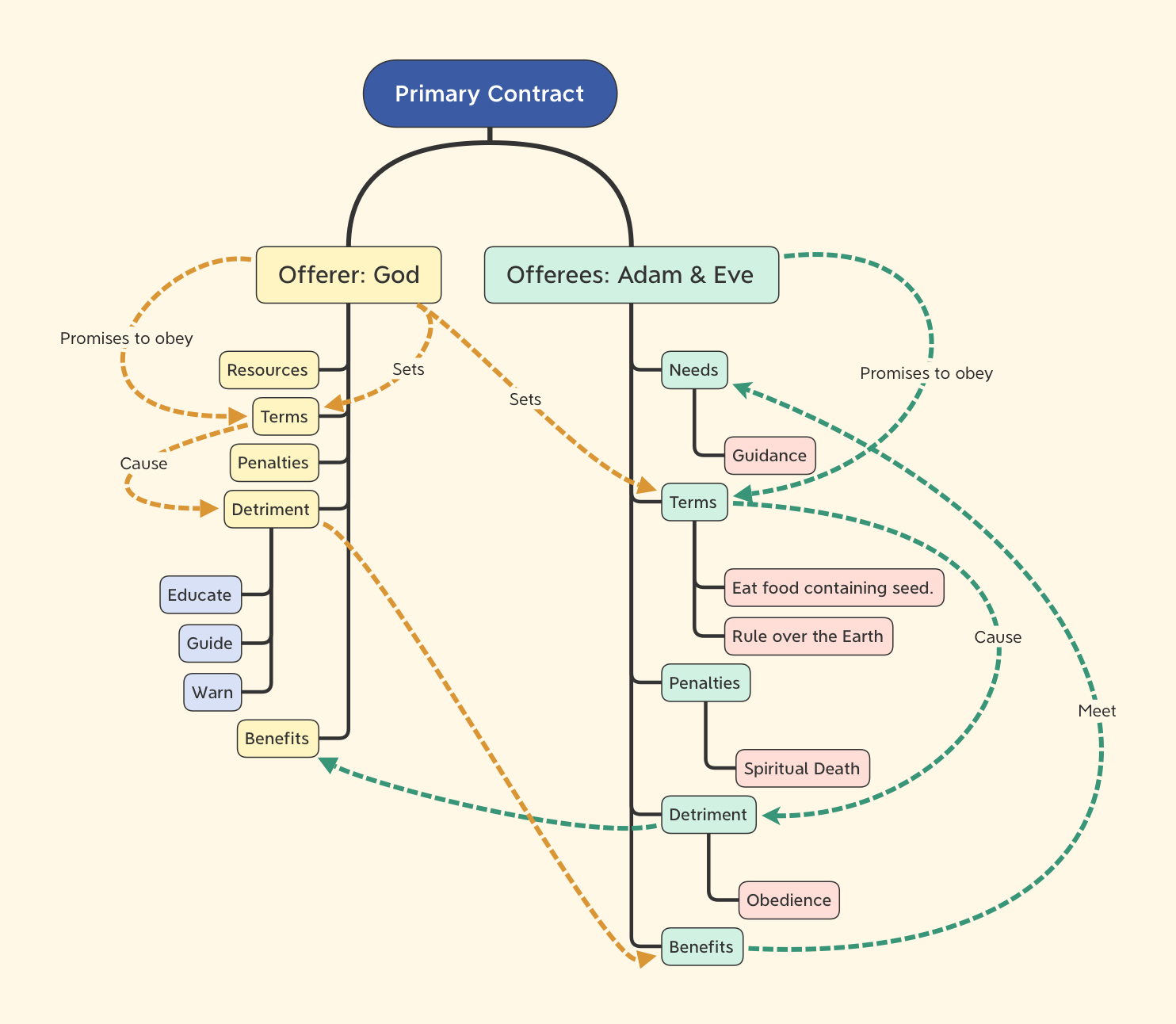
Fig.1: Eden - 1º Contract

The Primary Contract is a component of the Eden Covenant (itself a contract). The Law is the union of all the component terms of a covenant:
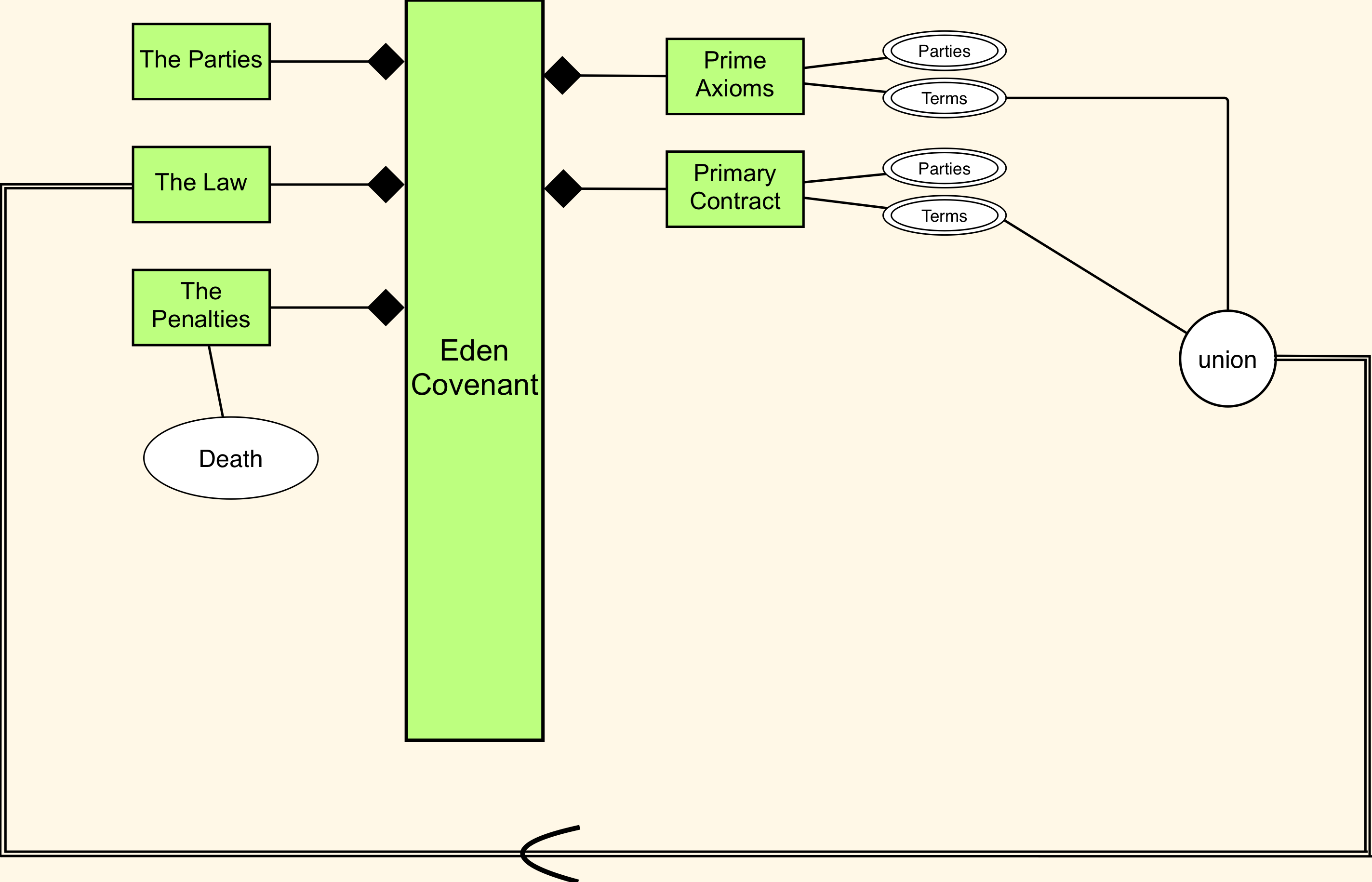
Fig.2: Eden - Covenant Law

While we may not know the specifics of the terms of the Primary Contract which the Lord God offered His Son, the Heavenly Beings, or mankind, Jesus explained the underlying intentions:
34 Hearing that Jesus had silenced the Sadducees, the Pharisees got together. 35 One of them, an expert in the law, tested him with this question: 36 "Teacher, which is the greatest commandment in the Law?"
37 Jesus replied: " 'Love the Lord your God with all your heart and with all your soul and with all your mind.' 38 This is the first and greatest commandment. 39 And the second is like it: 'Love your neighbor as yourself.' 40 All the Law and the Prophets hang on these two commandments." (Matthew 22:34-40 NIV)
These two rules exist at the Spiritual Level. Because they are abstract, they can be mapped to any group of people in any domain. And, being abstract, they map to the terms of the contract between the parties. Since the terms of a covenant are enforceable in the courts, label them 'Covenant Law'.
They are abstract rules since they do not explain how we are to obey God, nor how we are to take care of our neighbour, But their abstract nature allows the Lord God to map them to the Heavenly Realm or to the known world.
A contract generally arises out of a need for something. This can cover a wide range of things, from taking out a mobile phone contract ... to buying a house.
Another party may recognise and be in a position to meet a particular need and, sensing an opportunity for profit, will then make an offer. We are familiar with the concept for it is a part of everyday life.
Those individuals wishing to dwell in God's company will need guidance and help if they are to avoid breaking any of His House Rules. Since it is the Lord God who defines the House Rules, we must remain forever dependent on Him for help and direction.
The Lord God pursues perfection to the nth degree, making the Heavenly Realm a high-risk environment! New arrivals will not know God's definitions of perfection; they will not know about His code of conduct; and they will not know the difference between right and wrong.
Thus, left to their own devices, the new arrivals will inevitably make mistakes which, left unchecked, would rapidly reduce the Heavenly Realm to disorder and chaos. But, since the Lord's intention is to eventually remove all imperfection and wrongdoing, those falling into sin and error would be banished from His presence (ie,they would suffer Spiritual Death).
After God's standards and commandments have been explained to people, there are still pitfalls which must be avoided. The Scriptures make it clear that unintentional sins are still sins, sins for which expiation is required:
22 If you unwittingly fail to observe any one of the commandments that the LORD has declared to Moses—23 anything that the LORD has enjoined upon you through Moses—from the day that the LORD gave the commandment and on through the ages:
24 If this was done unwittingly, through the inadvertence of the community, the whole community shall present one bull of the herd as a burnt offering of pleasing odor to the LORD, with its proper meal offering and libation, and one he-goat as a sin offering. 25 The priest shall make expiation for the whole Israelite community and they shall be forgiven; for it was an error, and for their error they have brought their offering, an offering by fire to the LORD and their sin offering before the LORD. 26 The whole Israelite community and the stranger residing among them shall be forgiven, for it happened to the entire people through error.
27 In case it is an individual who has sinned unwittingly, he shall offer a she-goat in its first year as a sin offering. 28 The priest shall make expiation before the LORD on behalf of the person who erred, for he sinned unwittingly, making such expiation for him that he may be forgiven. 29 For the citizen among the Israelites and for the stranger who resides among them—you shall have one ritual for anyone who acts in error. (Numbers 15:22-29 (Tanakh))
Which applies collectively as well as individually. Some may think this unfair! But it an indication of God's uncompromising commitment to perfection. We underestimate that commitment at our peril; and we reject His standards to our everlasting damnation.
We cannot possibly know the House Rules unless they are explained to us. And in a changing world there are going to be new rules and, perhaps, amendments to some of the existing ones. We lack the Lord's knowledge, understanding, foresight, and analytical ability. The net result is that we will be forever behind the curve and playing catch-up. In other words, our dependence on the Lord God will never end.
We need the Lord God to explain the current House Rules and to define what is right and what is wrong; and in our changing world we need Him to be continually looking ahead in order to direct us away from any new danger which might arise, and of which we may be totally unaware.
Then, if we are to find true fulfilment in this life, it is imperative to go beyond the Covenant, and ask the Lord God to explain His plans for our lives - not only on an individual basis, but collectively as well.
We also need someone to whom we can turn when we are faced with baffling problems, or choices which are completely new, and for which there is no precedent.
And when we are in distress and under immense strain, distracted, and unable to think clearly, we need someone to whom we can turn in order to find support, encouragement, and direction.
During life's journey we may well be exposed to physical or spiritual danger, for few people go through life unscathed. Job, for example, remains a legend to this day. Paul summarises some of his own experiences in 2 Cor. 6:5 ESV; 2 Cor. 11:23-28 ESV. The Psalmist is prepared to face the dangers ahead of him (Ps. 23:3-4 ESV). Both the Lord God (Dan. 11 and 12) and Jesus (Mat. 24) warn of physical and spiritual dangers to be faced as the world descends into evil beyond our imagination.
Then there are those dark days when we discover we are victims of the Christian church's incompetence, negligence, stupidity, and evil. The church may sweep their failures under the carpet, as has been attempted with the paedophile priests (q.v.), but the victims cry out in their need for help, direction, justice, and redress...
We need God's help every moment of every day. Reliance on our own interpretation of perfection and what is right, will assuredly end in tears. To go forward in our own strength is to fail - we need to depend on the Lord God and to make use of the resources He freely places at our disposal.
But it isn't only the individual who stands in need. For the Lord God also speaks to groups. For instance: the Levites, Israel, the surrounding nations, Nineveh, seven churches in Asia Minor... The collective responsibility of mankind is immediately apparent when we look at Gen. 1:26-28 T. And so we see the emergence of collective responsibility and the need which accompanies it. A group must collectively seek God's direction and help, and discuss matters with Him on a daily basis.
Collective responsibility ultimately falls on the shoulders of each member of the group. Nevertheless, they are required to work together in unity and harmony in order that they might carry out the wishes of the Lord God. Failure will have consequences at both the individual and collective levels. For an example, check out the Zadok Amendment to the Mosaic Contract.
The Lord God offers the Primary Contract to those who have reached the Age of Discretion.
But that offer is contained in a package - the Covenant. The Covenant is itself a contract having various components; not only that, but the Covenant is itself subject to dynamic update. The Eden Covenant, for example, comprises the Prime Axioms and the Primary Contract: in other words, the Prime Axioms and the Primary Contract are components of the Eden Covenant.
The Covenant is not static, but can change dynamically, across the timeline according to need:
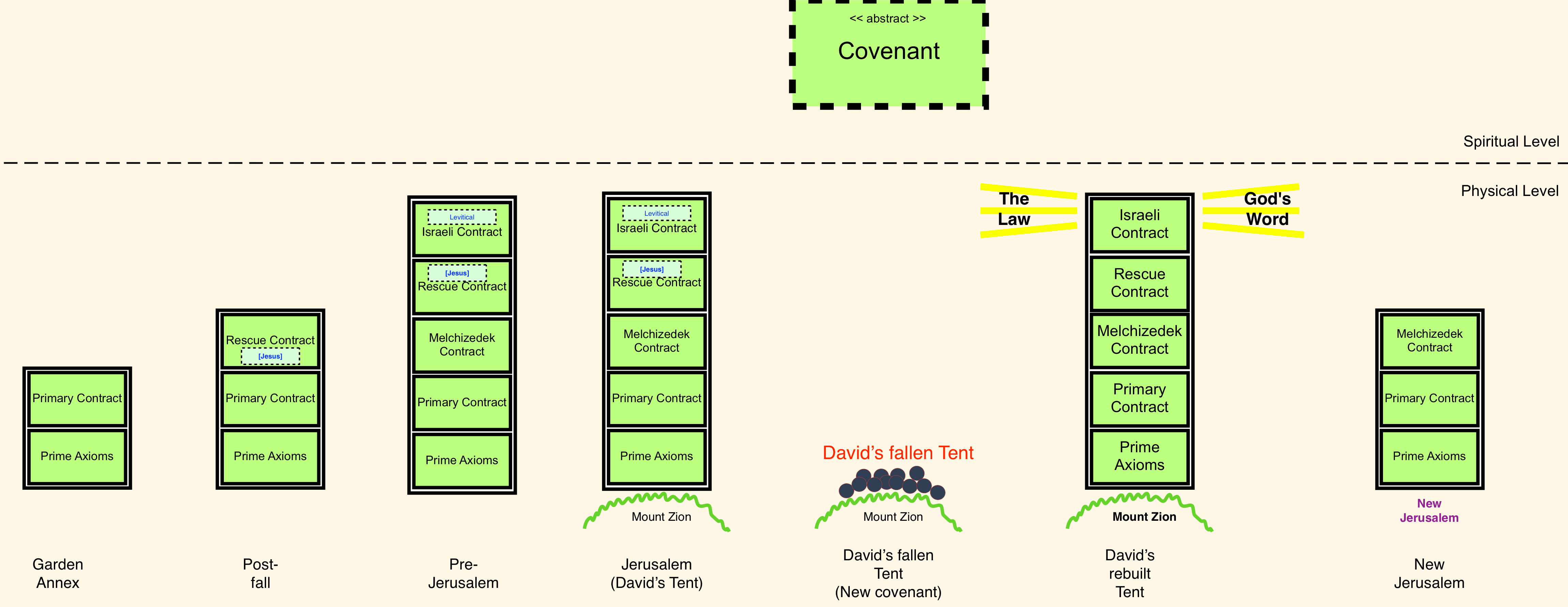
Fig.3: Covenant Evolution
If the Covenantmankind is an abstract contract at the Spiritual Level, then the above diagram illustrates various amended instantiations across the timeline.
There are two aspects which must be considered:
(i) the duration of God's offer; and
(ii) the duration of the [signed] contract itself.
Another issue demanding an answer concerns the legality, or otherwise, of the annulment of the Mosaic Covenant by Paul et al.
With regard to the Heavenly Beings, it is a one-time offer made to those who have reached the Age of Discretion. On reaching the Age of Discretion a choice must then be made. To attempt to defer a decision to a later date is to reject God. The status of those who reject God will change from innocent to guilty; and because they are eternal beings their guilt will remain without any opportunity for repentance and salvation.
The situation is different for mankind because they are mortal. God's offer will remain on the table throughout a person's life on Earth, unless they have been blacklisted. If any reject God on reaching the age of discretion, then their status will change from innocent to guilty. But because they are mortal they still have the offer of salvation (as contained in the Rescue Contract). This allows the Lord God to keep the offer of the Primary Contract on the table for, in signing up to the Rescue Contract, one must also sign up to the Primary Contract [and the Prime Axioms, of course].
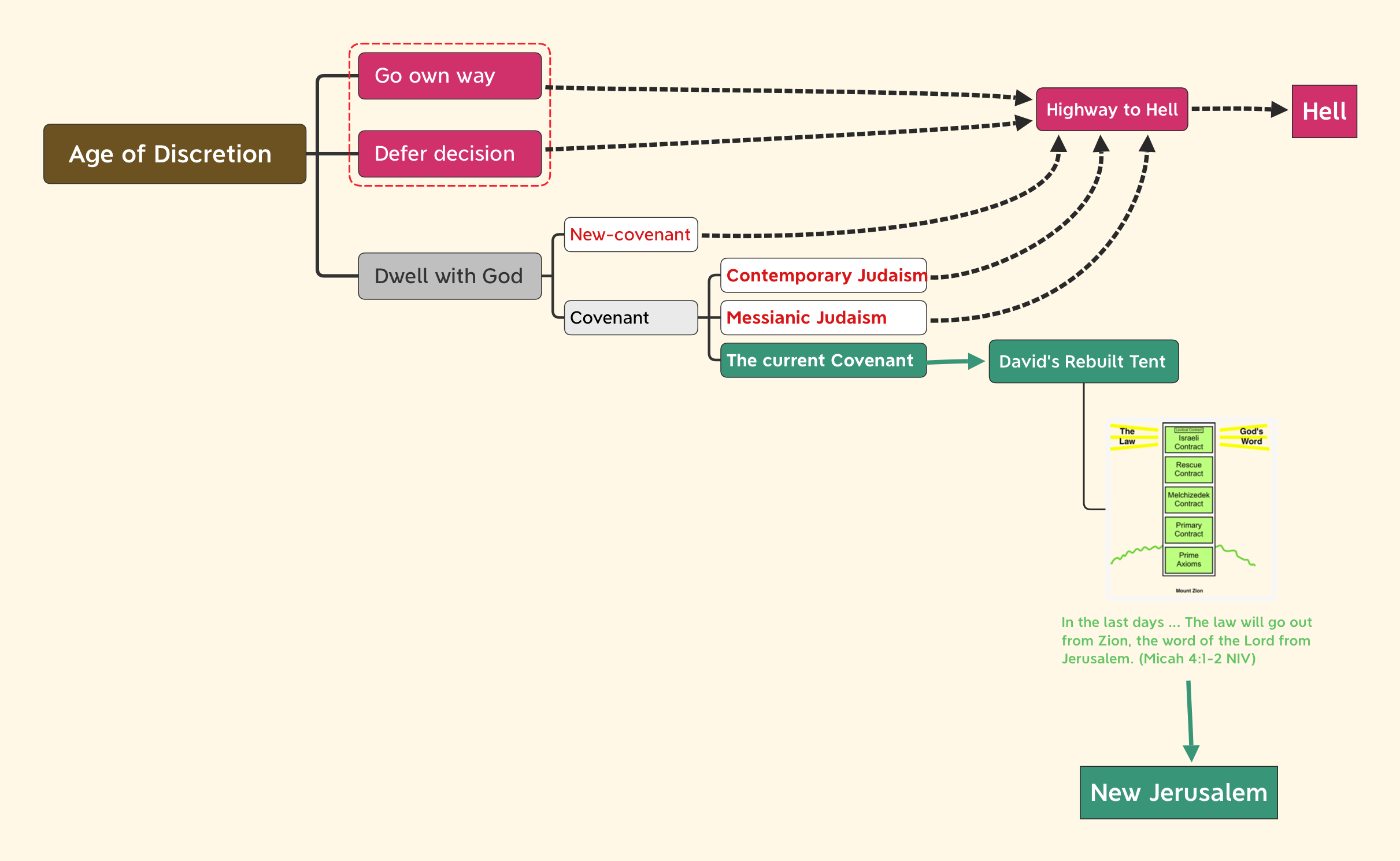
Fig.4: Age of Discretion - choices
It would be easy to underestimate the urgency of God's offer. Before reaching the age of discretion, one's name is not contained in the Books of Record: lacking knowledge and understanding, one is deemed 'innocent', for a child would not be in a position to understand a contract. On reaching the age of discretion, an immediate decision is required. One might think to defer acceptance to a later date. But such a course of action is fraught with danger.
Deferring the decision until later presupposes an opportunity to rethink and re-evaluate. I remember a good friend at school who died in an accident, and am reminded of the dangers associated with a deferred decision. Time and circumstances are not always on our side.
God's contracts and their amendments operate on an 'opt-in' policy: which means that individuals are opted-out by default. The Lord God demands positive commitment to the initial contract and to any subsequent amendments. Having reached the age of discretion, one has to commit to the Primary Contract in order to benefit from it. So those choosing to defer a decision are rejecting God and His timely offer of help, and an entry will be made to that effect in the Books of Record. Their state will immediately and irrevocably change from 'innocent' to 'guilty'. To reject God - or His Son - is to be rejected by Him:
47 If anyone hears my words and does not keep them, I do not judge him; for I did not come to judge the world but to save the world. 48 The one who rejects me and does not receive my words has a judge; the word that I have spoken will judge him on the last day. 49 For I have not spoken on my own authority, but the Father who sent me has himself given me a commandment - what to say and what to speak. 50 And I know that his commandment is eternal life. What I say, therefore, I say as the Father has told me." (John 12:47-50 ESV).
The Primary Contract - together with the Prime Axioms - will continue in place throughout Eternity in the Heavenly Realm. We shall never - neither in this life nor the next - lose our complete dependence on the Lord God Almighty.
As for the annulment of the Covenant by Paul et al, that was an illegal act at both the secular and spiritual levels.
[Homework assignment: Why, technically speaking, was the Lord unable to destroy Noah along with the rest of mankind in the flood?]
[Homework assignment: Dissertation: The annulment of the Covenant by Paul et al was illegal at the secular and spiritual levels.]
The Primary Contract exists between:
Each new arrival is characterised by their complete ignorance of the Lord God, His standards, His plans, and His code of conduct. Each newcomer stands in need of God's education, help, and direction if they are to survive in His presence. For one wrong step, even though unintentional, will result in exclusion from His presence.
[The 'offerer' is the Lord God. The 'offerees' are those new arrivals, whether in the Heavenly Realm or on Earth, standing in need of His help and direction.]
The Lord God is the one who is in a position to meet all the needs of newcomers to His realm; and it is He who makes the offer of the Primary Contract contained within the Covenant.
In the Garden Annex to the Heavenly Realm, the parties to the Primary Contract are:
At this point on the timeline, Jesus is not explicitly represented in the contract. It will only be after the fall and expulsion from the Garden Annex that Jesus will be represented in the Rescue Contract. Initially, this representation will be implied; but it will be formally included in Law when the Mosaic Contract is instantiated.
Many will undoubtedly have taken out a contract which contains various exclusions. Pet insurance is a typical example.
Exclusions will be listed in full in the terms of an agreement.
However, exclusion may be applied indirectly by inflating the renewal premium to an unafforable level.
As for the Primary Contract, the Lord God excludes no one who has reached the Age of Discretion. His offer is open to every new arrival. But whether an individual / group wish to avail themselves of the offer is up to them.
Although no one is excluded on reaching the Age of Discretion, those sinners who subsequently have been Blacklisted are excluded from the Covenant.
The Eden Covenant:
[Assignment:Sketch and annotate a schematic of the consideration present in the Eden Covenant.]
It is assumed that the Lord God will faithfully abide by the terms of the Covenant. As for Adam and Eve in the Garden Annex, the penalty for breaking the Covenant is Death (ie, exclusion from the Garden Annex and God's presence).
A contract has to be fully understood before one can commit to it. One cannot therefore sign until one has reached the Age of Discretion.
Education of the child must ensure that they reach the Age of Discretion with the knowledge and understanding which will allow them to make the right choice as to whether they wish to dwell with the Lord God. In the Garden, the Lord educated Adam and Eve; but He subsequently handed responsibility to the parents. For example:
[9] Only be careful, and watch yourselves closely so that you do not forget the things your eyes have seen or let them slip from your heart as long as you live. Teach them to your children and to their children after them. (Deuteronomy 4:9 NIV)
[19] Teach them to your children, talking about them when you sit at home and when you walk along the road, when you lie down and when you get up. [20] Write them on the doorframes of your houses and on your gates, (Deuteronomy 11:19-20 NIV)
[Dissertation: The education of children up to the Age of Discretion.]
Even if a contract is excellent in every way, there may be those who find it neither relevant nor necessary. In which case the offer will be declined.
The Lord God doesn't want people held against their will; He wants people who desire to dwell with Him, and who choose Him. For this reason, the Lord grants free will. There is no coercion! The absence of coercion leaves the Lord free to make use of contractsL (all contracts must necessarily be free of any taint of coercion or duress).
One cannot drift into a contract. A definite act of commitment is required since, by default, one is opted out. One has to opt-in to God's contracts, as, for example, took place at the foot of Mount Sinai (Ex. 24:7-8 T. It is also necessary to opt-in to any amendments, as can be seen by Jesus' instructions to His disciples:
16 Then the eleven disciples went to Galilee, to the mountain where Jesus had told them to go. 17 When they saw him, they worshiped him; but some doubted. 18 Then Jesus came to them and said, "All authority in heaven and on earth has been given to me. 19 Therefore go and make disciples of all nations, baptizing them in the name of the Father and of the Son and of the Holy Spirit, 20 and teaching them to obey everything I have commanded you. And surely I am with you always, to the very end of the age." (Matthew 28:16-20 NIV)
[Assignment: Believing in a contract is not the same as committing to it. Discuss.
What are the implications regarding Paul's doctrine of 'faith'?]
One does not sign on the dotted line, add the date and perhaps location, and then stick this contract in a drawer against the Last Day. For this is a living contract, and must be complied with every minute of every day without fail. It calls for continuous discussion with the Lord God, and faithful obedience.
Understanding and acceptance are a prerequisite to commitment, to becoming a signatory. When all parties are completely satisfied, they must sign and date the agreement; if the signatories are assembled together, then it is customary to record the place where the signing took place.
Solemnisation of a contract can take place in several ways. Today, it is common to use written agreements signed in ink, or by ticking a box in an online document.
In the case of verbal agreements these are often solemnized with a handshake.
By way of contrast, at the foot of Mount Sinai the contract was solemnized with the sprinkling of blood:
7 Then he took the record of the covenant and read it aloud to the people. And they said, "All that the LORD has spokenwe will faithfully do!" 8 Moses took the blood and dashed it on the people and said, "This is the blood of the covenant that the LORD now makes with you concerning all these commands." (Exodus 24:7-8 (Tanakh)).
When Ruth12C was alive it was customary to validate a transaction with the exchange of a sandal:
7 Now this was formerly done in Israel in cases of redemption or exchange: to validate any transaction, one man would take off his sandal and hand it to the other. Such was the practice in Israel. 8 So when the redeemer said to Boaz, “Acquire for yourself," he drew off his sandal. (Ruth 4:7-8 (Tanakh))
Jesus explains how - through baptism and obedience - we are to become signatories to the Messaianically amended Covenant:
Then Jesus came to them and said, "All authority in heaven and on earth has been given to me. 19 Therefore go and make disciples of all nations, baptizing them in the name of the Father and of the Son and of the Holy Spirit, 20 and teaching them to obey everything I have commanded you. And surely I am with you always, to the very end of the age." (Matthew 28:18-20 NIV).
New converts are required to become integrated into and become a part of the community. Indeed, the time is coming when some Gentiles will be taken as Levitical Priests:
18b The time has come to gather all the nations and tongues; they shall come and behold My glory. 19 I will set a sign among them, and send from them survivors to the nations: to Tarshish, Pul, and Lud—that draw the bow—to Tubal, Javan, and the distant coasts, that have never heard My fame nor beheld My glory. They shall declare My glory among these nations. 20 And out of all the nations, said the LORD, they shall bring all your brothers on horses, in chariots and drays, on mules and dromedaries, to Jerusalem My holy mountain as an offering to the LORD — just as the Israelites bring an offering in a pure vessel to the House of the LORD. 21 And from them likewise I will take some to be Levitical priests, said the LORD. (Isaiah 66:18b-21 (Tanakh))
Once signed, the contract becomes legally binding on all the parties, and will be rigorously applied in the Court of No Appeal on the Day of Judgement: Jesus said to the unbelieving Jews who were persecuting Him:
[45] "But do not think I will accuse you before the Father. Your accuser is Moses, on whom your hopes are set." (John 5:45 NIV)
The Law in the Garden Annex:

Fig.1: Garden of Eden - the Law.
The Law at the time of Moses:
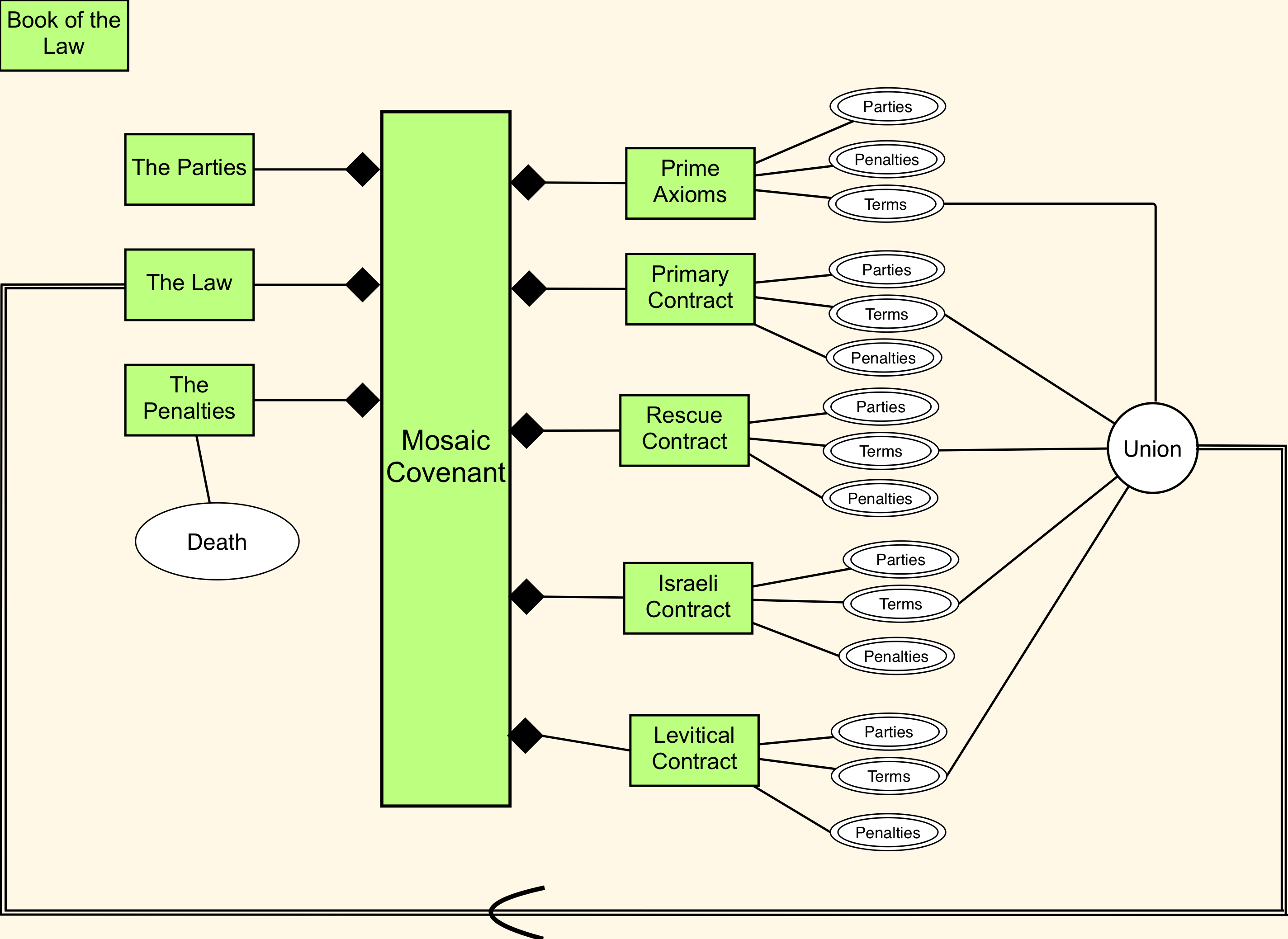
Fig.2: Mosaic Covenant - the Law.
Today, following the annulment of the Covenant by Paul and the unknown writer to the Hebrews, and in combination with the destruction of the Jerusalem Temple in 70 BCE, the Covenant is no longer enforceable at the Physical Level. Necessarily, therefore, commandments are derived for a situation by application of the Two Abstract Rules on the current covenant which exists in the Heavenly Realm. Which presupposes a knowledge and understanding of the Covenant at the Spiritual Level, and a good knowledge of the world in which one lives.
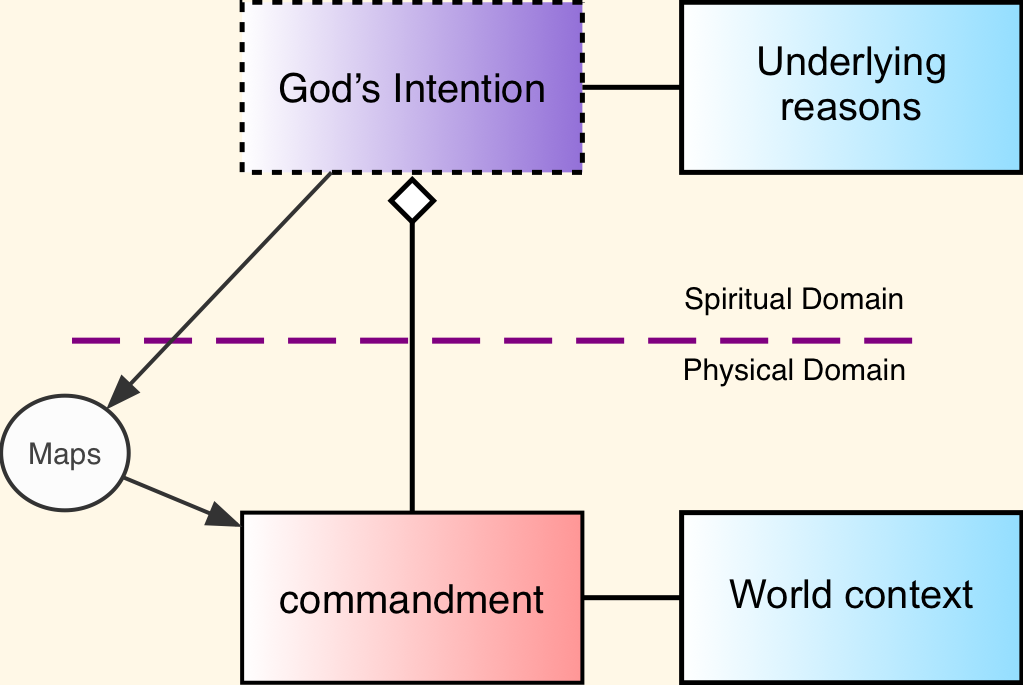
Fig.3: Evaluation of the Two Abstract Rules by mankind.
Note that mankind cannot change God's intentions at the Spiritual Level!
[Dissertation: Evolution of Covenant Law across the timeline.]
See Safeguards
[Dissertation: Safeguards within the Covenant.]
Version: 2024-11-21